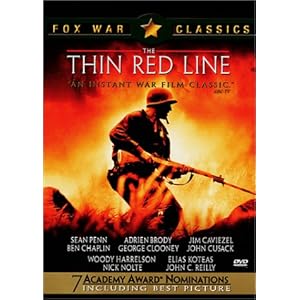
The only thing crazier than how many recognizable actors there are in this movie is how many had their scenes cut completely during the editing process, including Martin Sheen, Gary Oldman, and Mickey Rourke. War movies have a funny away of apparently attracting attention from everyone in the business, as The Thin Red Line was released the same year as Saving Private Ryan, which itself has an extensive and extremely famous cast. I thought it was less distracting here though, except for the scene near the end where George Clooney shows up to give a speech than Sean Penn narrates over.
The Thin Red Line is overall a more painterly and less action-oriented war film than Ryan, focusing more on the internal lives of the soldiers than the combat they take part in. I think they're actually pretty good companion films. Ryan is in the European theater and wears its heart on its sleeve, Line is in the Pacific and a bit more introspective and detached. Ryan begins with one of the most famous war scenes ever made, a gigantic, loud, violent slaughter. Line begins with a soldier played by Jim Caviezel resting on an island with some natives, and there's a full 45 minutes before anyone is in real danger. They're both gorgeous movies, Ryan with its color correction and perfectly chaotic action, Line with its more natural cinematography and focus on wildlife, and intricately pieced together battle scenes.
This is the first movie by Terrence Malick that I've seen (hey, he's only made five), and I was very impressed by his work, though I'm not sure how much I'd like his other stuff. The way intense fighting punctuates and breaks up the long periods of slow moving or still scenery with minimal dialogue creates an intriguing contrast, but a film of nothing but the latter might be tough to handle. Of course, I have no idea if any of his other movies are like that, other than to say I get the impression that that's what The Tree of Life might resemble.
In any case, The Thin Red Line is not a perfect war movie, but I do think it is a great one. There are many brilliant and captivating scenes, and even when things slow down, it's still very nice to look at. If there's one viable criticism, it does seem a bit scattered at times, as it sort of lacks a central figure, and instead bounces from soldier to soldier, letting them narrate their thoughts in turn. The performances are generally very good, even if none of them are terribly substantial. John C. Reilly gets what I think is a single scene of dialogue, and certain characters will pop in at a certain point and then just disappear completely, like the parts played by John Cusack and John Travolta. Nick Nolte might have the most dialogue as an impassioned Lieutenant Colonel, though Penn and Caviezel probably have the biggest parts from a screen time perspective.
It's hard to say whether the somewhat disjointed nature of the film is entirely intentional, or a result of Malick having to trim about 40% of his original cut, or if the full thing was even worse with the additional characters. I didn't really mind the movie being this way, because it was an engrossing experience while watching it. It does result in a slight feeling of dissatisfaction though, especially in retrospect, not having a real central plot to grasp onto. I guess war though can be a pretty existential experience, and this is about as existential as war movies can get. In that way, it's sort of a masterpiece.
AAAAAGGGHHHH
16 years ago


































No comments:
Post a Comment